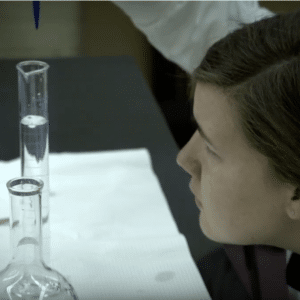Student spotlight
Taylor Lambrigger, Senior
Major: Anthropology, Biology; research funded through Hooper Undergraduate Research Award program Mentor: Corina KellnerResearcher seeks to restore humanity through chemistry

For undergraduate researcher Taylor Lambrigger, her work is about using chemistry to restore humanity to unidentified individuals. Lambrigger, double majoring in anthropology and biology, works in NAU bioarchaeologist Corina Kellner’s stable isotope lab. Funded by a Hooper Undergraduate Research Award grant, Lambrigger is testing unidentified human remains in collaboration with the Coconino County Medical Examiner’s office. Because, when broken down to an elemental level, human remains can tell an origin story.
“You are what you eat, what you drink and where you’re from,” Lambrigger explained. “Isotopes embed into your enamel and bone every time you eat or drink something. We can grind those up and look at the ratios of those isotopes and we can tell what you ate and where your water came from.”
Lambrigger is working with samples of human remains given to her by the Coconino County Medical Examiner’s Office. The samples consist of small amounts of bone or tooth that she crushes and processes using different kinds of chemicals. Once they have been processed, Lambrigger can identify the amounts of carbon, oxygen, nitrogen, strontium and lead in the samples. From that, she can extrapolate where the person was from. The carbon, oxygen and nitrogen analyses are being done in house here at the NAU Colorado Plateau Stable Isotope Laboratory in Wettaw, while Lambrigger and Kellner are collaborating with Frank Ramos of the Department of Geological Sciences at New Mexico State University for the strontium and lead analyses.
“It works well with ancient populations because they were pretty stagnant,” said Lambrigger. “But with globalization, we’re testing the utility on these remains.”
The method has been used successfully. In 2005, human remains found in Ireland were tied to a missing man after isotopic evaluation showed he had emigrated from Africa. Governments use the process to identify the remains of soldiers.
Lambrigger, who is the president of NAU’s Model United Nations club, hopes to someday work with mass grave excavation and remain repatriation.
“These people have had their humanity taken from them in horrible, violent ways, and if there’s anything I can do to give that humanity back or to help healing occur, then I want to help.”
The opportunity to write a grant and get funding for research as an undergraduate has been transformative for her.
“I’m unbelievably grateful for the chance I’ve had to do what I’m doing. Where else can I get $3,500 for a project that I’m the principal investigator on? That’s an unbelievable opportunity.”
